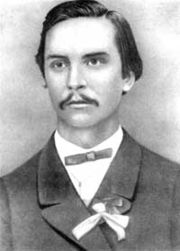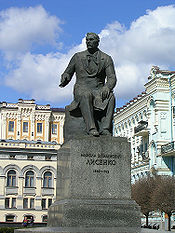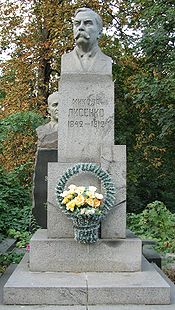
Mykola Lysenko
Encyclopedia



Ukraine
Ukraine is a country in Eastern Europe. It has an area of 603,628 km², making it the second largest contiguous country on the European continent, after Russia...
composer
Composer
A composer is a person who creates music, either by musical notation or oral tradition, for interpretation and performance, or through direct manipulation of sonic material through electronic media...
, pianist
Pianist
A pianist is a musician who plays the piano. A professional pianist can perform solo pieces, play with an ensemble or orchestra, or accompany one or more singers, solo instrumentalists, or other performers.-Choice of genres:...
, conductor
Conducting
Conducting is the art of directing a musical performance by way of visible gestures. The primary duties of the conductor are to unify performers, set the tempo, execute clear preparations and beats, and to listen critically and shape the sound of the ensemble...
and ethnomusicologist.
Biography
Lysenko was born in Hrynky, KremenchukKremenchuk
Kremenchuk is an important industrial city in the Poltava Oblast of central Ukraine. Serving as the administrative center of the Kremenchutskyi Raion , the city itself is also designated as a separate raion within the oblast, and is located on the banks of Dnieper River.-History:Kremenchuk was...
Povit, Poltava Governorate
Poltava Governorate
The Poltava Governorate or Government of Poltava was a guberniya in the historical Left-bank Ukraine region of the Russian Empire, which was officially created in 1802 from the disbanded Malorossiya Governorate which was split between the Chernigov Governorate and Poltava Governorate with an...
, the son of Vitaliy Romanovich Lysenko (Ukrainian: Віталій Романович Лисенко). From childhood he became very interested in the folksongs of Ukrainian peasants and by the poetry of Taras Shevchenko
Taras Shevchenko
Taras Hryhorovych Shevchenko -Life:Born into a serf family of Hryhoriy Ivanovych Shevchenko and Kateryna Yakymivna Shevchenko in the village of Moryntsi, of Kiev Governorate of the Russian Empire Shevchenko was orphaned at the age of eleven...
. When Shevchenko's body was brought to Ukraine after his death in 1861, Lysenko was a pallbearer
Pallbearer
A pall-bearer is one of several funeral participants who helps carry the casket of a deceased person from a religious or memorial service or viewing either directly to a cemetery or mausoleum, or to and from the hearse which carries the coffin....
. During his time at Kiev University
Kiev University
Taras Shevchenko University or officially the Taras Shevchenko National University of Kyiv , colloquially known in Ukrainian as KNU is located in Kiev, the capital of Ukraine. It is the third oldest university in Ukraine after the University of Lviv and Kharkiv University. Currently, its structure...
, Lysenko collected and arranged Ukrainian folksongs, which were published in seven volumes. One of his principal sources was the kobzar
Kobzar
A Kobzar was an itinerant Ukrainian bard who sang to his own accompaniment.-Tradition:Kobzars were often blind, and became predominantly so by the 1800s...
Ostap Veresai
Ostap Veresai
Ostap Mykytovych Veresai , was a renowned minstrel and kobzar from the Poltava Governorate of the Russian Empire...
(after whom Lysenko later named his son).
Lysenko was initially a student of Biology at the Kharkiv University
Kharkiv University
The University of Kharkiv or officially the Vasyl Karazin Kharkiv National University is one of the major universities in Ukraine, and earlier in the Russian Empire and Soviet Union...
, studying music privately. On a scholarship which he won from the Russian Music Society he pursued further professional music studies at the Leipzig Conservatory. It is there that he understood the importance of collecting, developing and creating Ukrainian music rather than duplicating the work of Western classical composers.
On his return to Kiev
Kiev
Kiev or Kyiv is the capital and the largest city of Ukraine, located in the north central part of the country on the Dnieper River. The population as of the 2001 census was 2,611,300. However, higher numbers have been cited in the press....
he continued to create Ukrainian themed compositions. His Ukrainophilic approach to composition was not supported by the Russian Imperial Music Society which promoted a Great Russia
Great Russia
Great Russia is an obsolete name formerly applied to the territories of "Russia proper", the land that formed the core of Muscovy and, later, Russia...
n cultural presence in Ukraine. As a result Lysenko severed his relationship with them, never to compose any music set to the Russian language
Russian language
Russian is a Slavic language used primarily in Russia, Belarus, Uzbekistan, Kazakhstan, Tajikistan and Kyrgyzstan. It is an unofficial but widely spoken language in Ukraine, Moldova, Latvia, Turkmenistan and Estonia and, to a lesser extent, the other countries that were once constituent republics...
, nor allow any translations of his works into the Russian language.
In order to improve his orchestration and composition skills the young Lysenko traveled to St. Petersburg where he took orchestration lessons from Nikolay Rimsky-Korsakov
Nikolai Rimsky-Korsakov
Nikolai Andreyevich Rimsky-Korsakov was a Russian composer, and a member of the group of composers known as The Five.The Five, also known as The Mighty Handful or The Mighty Coterie, refers to a circle of composers who met in Saint Petersburg, Russia, in the years 1856–1870: Mily Balakirev , César...
in the mid 1870s, but his fervent Ukrainian national position and disdain for Great Russian autocracy retarded his career. He supported the 1905 revolution
Russian Revolution of 1905
The 1905 Russian Revolution was a wave of mass political and social unrest that spread through vast areas of the Russian Empire. Some of it was directed against the government, while some was undirected. It included worker strikes, peasant unrest, and military mutinies...
and was in jail briefly in 1907. In 1908, he was the head of the Ukrainian Club, an association of Ukrainian national public figures in Kiev.
For his opera
Opera
Opera is an art form in which singers and musicians perform a dramatic work combining text and musical score, usually in a theatrical setting. Opera incorporates many of the elements of spoken theatre, such as acting, scenery, and costumes and sometimes includes dance...
libretti
Libretto
A libretto is the text used in an extended musical work such as an opera, operetta, masque, oratorio, cantata, or musical. The term "libretto" is also sometimes used to refer to the text of major liturgical works, such as mass, requiem, and sacred cantata, or even the story line of a...
Lysenko insisted on using only the Ukrainian language. Tchaikovsky
Pyotr Ilyich Tchaikovsky
Pyotr Ilyich Tchaikovsky Pyotr Ilyich Tchaikovsky Pyotr Ilyich Tchaikovsky (Russian: Пётр Ильи́ч Чайко́вский ; often "Peter Ilich Tchaikovsky" in English. His names are also transliterated "Piotr" or "Petr"; "Ilitsch", "Il'ich" or "Illyich"; and "Tschaikowski", "Tschaikowsky", "Chajkovskij"...
was impressed by Lysenko's Taras Bulba and wanted to stage the work in Moscow, but Lysenko's insistence on it being performed in the Ukrainian language, not Russian, prevented the performance from taking place in Moscow.
In his later years, Lysenko raised funds to open a Ukrainian School of Music. His death was widely mourned throughout Ukraine. Lysenko's daughter Mariana followed her father's footsteps as a pianist, and his son Ostap also taught music in Kiev.
Piano music
Lysenko's piano music is little known outside Ukraine. His piano works were considered by SovietSoviet Union
The Soviet Union , officially the Union of Soviet Socialist Republics , was a constitutionally socialist state that existed in Eurasia between 1922 and 1991....
musicologists to be derivative of Chopin
Frédéric Chopin
Frédéric François Chopin was a Polish composer and virtuoso pianist. He is considered one of the great masters of Romantic music and has been called "the poet of the piano"....
. As a result they have not sparked as much interest to musicologists as his vocal music.
Vocal music
Lysenko's early vocal music consisted of settings of Ukrainian folk songs and compositions primarily to the poetry of Taras Shevchenko. Later he began to include other Ukrainian poets in his portfolio and also translations of works by German poets, some of which he did himself.Interest in Lysenko's art songs to the words of prominent Ukrainian poets such as Taras Shevchenko
Taras Shevchenko
Taras Hryhorovych Shevchenko -Life:Born into a serf family of Hryhoriy Ivanovych Shevchenko and Kateryna Yakymivna Shevchenko in the village of Moryntsi, of Kiev Governorate of the Russian Empire Shevchenko was orphaned at the age of eleven...
, Lesia Ukrainka, and Oleksander Oles is increasing, partly due to the recent efforts of the British opera singer Pavlo Hunka.
Operas
Lysenko wrote a number of operatic works, including Natalka PoltavkaNatalka Poltavka (opera)
Natalka Poltavka is an opera in three acts by the Ukrainian composer Mykola Lysenko, based on the play Natalka Poltavka by Ivan Kotlyarevsky, first performed in 1889.-Background:...
, Utoplena (The Drowned Woman, after Gogol's May Night) and Taras Bulba
Taras Bulba (opera)
Taras Bulba is an opera in four acts by the Ukrainian composer Mykola Lysenko. The libretto was written by Mykhailo Starytsky after the novel Taras Bulba by Nikolai Gogol. The opera, which was unrevised at the time of the composer's death in 1912, was first performed in 1924...
.
Musicological studies
Lysenko made the first ethno-organological studies of the music of the blind kobzarKobzar
A Kobzar was an itinerant Ukrainian bard who sang to his own accompaniment.-Tradition:Kobzars were often blind, and became predominantly so by the 1800s...
Ostap Veresai
Ostap Veresai
Ostap Mykytovych Veresai , was a renowned minstrel and kobzar from the Poltava Governorate of the Russian Empire...
which he published in 1873-4; they are still exemplary. In this work Lysenko demonstrated the way in which Ukrainian melodic material differs from Russian analogues by its unique use and approach to chromaticism (something that was censored out in Soviet republications).
Lysenko continued to research and transcribe the repertoire of other kobzars from other regions such as Opanas Slastion
Opanas Slastion
Opanas Georgievych Slastion was a Ukrainian graphic artist, painter and ethnographer.He was born in the Ukrainian port town of Berdyansk on the Berdyansk Gulf of the Sea of Azov...
from Poltava
Poltava
Poltava is a city in located on the Vorskla River in central Ukraine. It is the administrative center of the Poltava Oblast , as well as the surrounding Poltava Raion of the oblast. Poltava's estimated population is 298,652 ....
and Pavlo Bratytsia from Chernihiv
Chernihiv
Chernihiv or Chernigov is a historic city in northern Ukraine. It is the administrative center of the Chernihiv Oblast , as well as of the surrounding Chernihivskyi Raion within the oblast...
. He also made a thorough study of other Ukrainian folk instruments such as the torban
Torban
The torban is a Ukrainian musical instrument that combines the features of the Baroque Lute with those of the psaltery. The Тorban differs from the more common European Bass lute known as the Theorbo in that it had additional short treble strings strung along the treble side of the soundboard. It...
. His collection of essays about Ukrainian folk instruments, makes him the founder of Ukrainian organology
Organology
Organology is the science of musical instruments and their classification. It embraces study of instruments' history, instruments used in different cultures, technical aspects of how instruments produce sound, and musical instrument classification...
.

